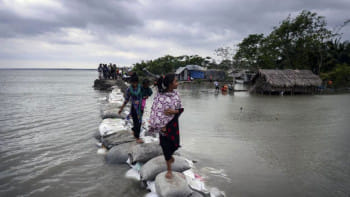Why can’t we do river excavation right?

There seems to be no end to instances of failed or half-baked river excavation in the country. The newest report on this issue highlights the situation in Banishanta union of Khulna's Dacope upazila, where Mongla port authorities are planning to dump sand and soil (excavated from the Pashur River) onto over 300 acres of cropland. For authorities to even consider such a harmful move is reprehensible. This particular excavation project was approved by the Executive Committee of the National Economic Council (Ecnec) on January 28, 2020. Already, port authorities have taken over 700 acres of land in the Chila area of Bagerhat district by dumping sand on it. And, according to the chairman of Banishanta Union Parishad, Mongla port police grounded red flags and signboards announcing their illegal occupation of the area's land on July 27. If this project is allowed to reach completion, it will ruin the livelihoods and cause displacement of thousands of people.
The project's original deadline was in June, but as is the case with most public projects, it is far from completion. Though in this instance, this may be a positive, given that it will allow authorities to take the farmers' protest into consideration and rethink the project altogether. Although Mongla Port authorities claim that the compensation from the government to affected locals – Tk 2 lakh per acre in 10 years – we have to agree with the farmers who say it is no match to the at least Tk 5 lakh they earn just by selling the crops they grow on the lands. This project is also concerning from an environmental perspective, as it would include filling up of land within 10km of the Sundarbans, which is prohibited as per a court directive.
Despite river excavation being a routine work in Bangladesh, our authorities often do it wrong. In June, we wrote about the Bhadra river in Khulna's Dumuria upazila, which was re-excavated by the Water Development Board (WDB) with a whopping Tk 46.25 crore only two years back, but became filled up again as the excavated earth fell from the river bank back into the river. Last May, another report detailed how the Charalkantha River in Nilphamari shrunk to a mere channel in many places, as the soil excavated from it in 2020 made it back to the river.
The government must investigate claims by locals that the Mongla port authorities are planning to dump sand onto croplands in Banishanta union despite there being alternatives. Such protests by economically disadvantaged citizens must be taken seriously, especially since it concerns the very source of income they depend on. River excavation work, and any public project, must be conducted while keeping in mind the betterment of citizens' lives – not by causing them suffering.


 For all latest news, follow The Daily Star's Google News channel.
For all latest news, follow The Daily Star's Google News channel. 






Comments